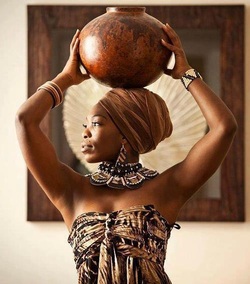 In my one-on-one consultations and through online communications, people frequently want to know simple ways to Live the Medicine. Sometimes, I find that people have great concepts, yet when I ask them what they’ve done to apply their ideas, the answer is usually nothing because they just don't know where to start. Getting a reading nowadays is relatively easy. Even getting initiated is a lot less cumbersome than it used to be. But the objective of all this is to enable change, which requires more than isolated events and activities. After growing my client base and observing what helps people achieve success in Orisa Lifestyle, I’ve come to realize that most successful devotees and priests share these five common characteristics: 1. Passion. The most dynamic devotees are usually compelled by a quest for deeper purpose beyond the sheer mechanics of performing rituals. My mission for OrisaCare, for example, is to empower devotees who are also human services professionals to take the lead in closing the gap between entrepreneurship, health and spiritual development. Above and beyond my ritual duties, I dedicate hours every day to studying and perfecting my craft. When you have passion for your practice, it will drive you to turn your idea into a reality. Without that spark, you'll lack the necessary motivation to put in all the early mornings and late nights to get your practice off the ground. 2. Perseverance. Devotees of OrisaLifestyle need to be able to deal with obstacles. A spiritual practice is a comprehensive system. It does not get built overnight. Consequently, turning your inspiration into a real practice will definitely take time. You'll have to get used to not being able to get easy answers. What makes devotees move from just having a good experience to having a great experience is having the perseverance to grow regardless of how many times you feel like you're the only one. When I first introduced the idea of Orisa Lifestyle, most people just ignored me and a few openly criticized my efforts. After I directly approached several people for partnership and support, I became quite frustrated at being met with what appeared to be blatant apathy and cold indifference. Without perseverance, I would have given up a long time ago. Follow-through is key. Even when you have to carry the load on your own, if you're successful, it is only a matter of time until others join your efforts. 3. Resourcefulness. Another vital ability for a practitioner of Orisa Lifestyle is knowing how to make the most of what you DO have. Your access to particular verses, kola nuts, iyerosun and tutuopon beads will be limited, so when you get them, you have to use them tstrategically. Tapping into a network is key. When I first started looking for fresh herbs, which I obviously could not get from West Africa, I reached out to local Santeria priests I knew. Within a short time, I had compiled a complete list of substitute herbs that grow in my own backyard. 4. Open-Mindedness. As a responsible and independent individual, you may think yourself capable of taking full control over your spiritual journey, but the reality is quite different. Because seniority is a key principle of the practice, you'll need to learn to take instruction from others. Then, when you discover that your original idea won’t work, you'll need to adjust. My original idea for a membership-based spiritual community was well-intended but it just didn't jive well with the culture of Orisa Lifestyle; it was too bookish and I was giving away things that a person really has to sacrifice to obtain. I had suspected it was not going to yield the right results but I kept hammering away at it until an elder from Nigeria came and observed my operation. Without any prompting, he started to admonish me to make some sweeping changes in my approach. He did not offer any viable solutions, per se. But I had to stay open to the overall direction he was advising me to lean towards. The array of classes, learning materials and membership activities that I offer today are the result of those changes and the work is far from finished. 5. Teachability. Orisa Lifestyle is a learning process. If you’re not willing to learn, think seriously about leaving the orisa world. You need to be able to soak in everything and anything you can, just like a sponge. The more you learn, the better. If you think you know all the answers it's only because you haven't been asked all the questions. One of the best ways to expose yourself to a lot of great questions is to teach Orisa Lifestyle to children. They always manage to conjure questions you would have NEVER imagined. When starting Camp Iwalewa - a summer art and outdoor education experience for school aged children - I honestly didn’t know anything about teaching orisa to children. I networked with other operators and soaked in all the information I could from similar programs. Now I know quite a bit about cultural arts education, from ways to introduce folk songs to leading nature walks and making musical instruments. Orisa Lifestyle is much more than what happens in the shrine. I don’t breathe without thinking about progressing my spiritual aspirations. If you have an idea you'd like to turn into a reality, let me help you go for it. You'll never know the outcome if you don't try. My VIP consultation is rooted in the understanding that personal experiences create spiritual values. To discuss your personal situation and begin the interview process, please contact Obafemi at 510.485.2336.
1 Comment
|
ObafemiOPriest, Educator, Consultant ArchivesCategories
All
|
 RSS Feed
RSS Feed